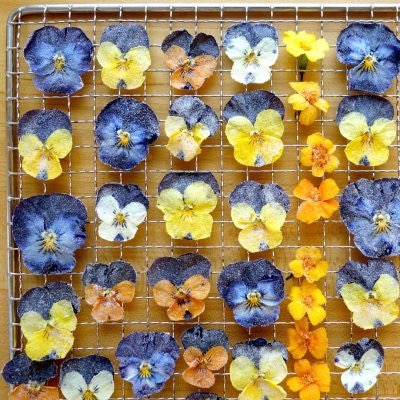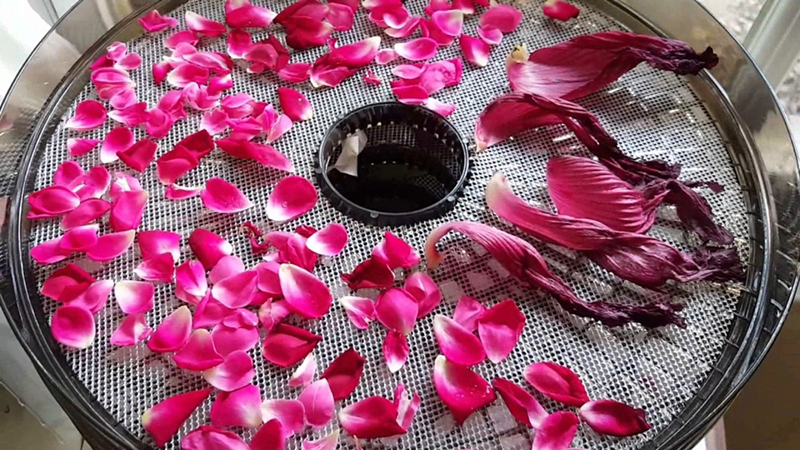
Content Menu
● Why Use a Food Dehydrator for Drying Flowers?
● How to Prepare Flowers for Drying
● Step-by-Step Guide to Drying Flowers in a Food Dehydrator
>> 1. Set the Right Temperature
>> 2. Monitor Drying Time
>> 3. Check for Doneness
>> 4. Cool Before Handling
● Best Flowers for Dehydrating
● Creative Uses for Dried Flowers
● Tips for Successful Flower Dehydration
● Common Mistakes to Avoid
● Conclusion
● FAQ
>> 1. Can all types of flowers be dried in a food dehydrator?
>> 2. How long does it take to dry flowers in a dehydrator?
>> 3. What temperature should I set my dehydrator for drying flowers?
>> 4. Can I use dried flowers in cooking?
>> 5. How do I store dried flowers after dehydration?
● Citations:
Drying flowers is a timeless way to preserve their beauty and fragrance for a variety of uses, from crafts to home décor. While traditional methods like air drying or pressing are common, using a food dehydrator offers a faster and more efficient alternative. If you've ever wondered, “Can you use a food dehydrator to dry flowers?”, the answer is a resounding yes! In this article, we'll explore how food dehydrators can be used to dry flowers, the benefits of this method, and tips for achieving the best results.

Why Use a Food Dehydrator for Drying Flowers?
Food dehydrators are designed to remove moisture from food items by circulating warm air at controlled temperatures. These features make them an excellent tool for drying flowers as well. Here are some reasons why:
- Faster Drying Times: Unlike air drying, which can take weeks, a food dehydrator dries flowers in just hours.
- Preservation of Color and Shape: The controlled environment prevents discoloration and helps maintain the natural shape of the flowers.
- Efficiency: You can dry multiple flowers at once in different trays, making it ideal for bulk projects.
- Versatility: A food dehydrator can handle delicate flowers like lavender or robust blooms like roses with ease.
How to Prepare Flowers for Drying
Before placing your flowers in the dehydrator, proper preparation is key to achieving the best results. Follow these steps:
1. Select Fresh Blooms: Choose flowers that are at their peak bloom stage. Avoid those that are wilted or damaged.
2. Clean Your Flowers: Rinse the flowers gently under cool water to remove dirt or insects. Shake off excess water and pat them dry with a soft cloth.
3. Trim Stems and Leaves: Cut stems to about 1–2 inches long and remove any leaves that could interfere with airflow.
4. Arrange on Trays: Lay the flowers flat on the dehydrator trays without overlapping them. This ensures even air circulation around each flower.
Step-by-Step Guide to Drying Flowers in a Food Dehydrator
Once your flowers are ready, follow these steps to dry them effectively:
1. Set the Right Temperature
Most flowers dry well at temperatures between 95°F (35°C) and 125°F (52°C). For delicate varieties like chamomile or lavender, opt for the lower end of this range.
2. Monitor Drying Time
The drying time depends on the type of flower and its moisture content but generally ranges from 4–12 hours. Check periodically to ensure they don't over-dry.
3. Check for Doneness
Flowers are ready when they feel dry to the touch but not brittle. If they crumble easily or still feel damp, adjust the drying time accordingly.
4. Cool Before Handling
Allow the dried flowers to cool completely before removing them from the trays. This step prevents breakage and helps them retain their shape.

Best Flowers for Dehydrating
Not all flowers are suitable for dehydration; some retain their beauty better than others. Below is a list of popular choices that work well in a food dehydrator:
- Roses: Perfect for potpourri or decorative arrangements due to their vibrant colors.
- Lavender: Retains its fragrance beautifully, making it ideal for sachets or herbal teas.
- Hydrangeas: Maintain their shape and color; great for wreaths or bouquets.
- Cornflowers: Their bright blue petals remain vibrant after drying.
- Calendula: Often used in herbal remedies; retains its sunny yellow hue.
Creative Uses for Dried Flowers
Dried flowers have countless applications beyond simple decoration. Here are some creative ideas:
- Potpourri: Combine dried petals with essential oils and spices like cinnamon or cloves for fragrant potpourri.
- Decorative Arrangements: Use dried blooms in wreaths, garlands, or shadow boxes as long-lasting décor.
- Craft Projects: Incorporate dried petals into handmade cards, bookmarks, or resin art.
- Herbal Teas and Infusions: Certain edible flowers like chamomile or calendula can be used in teas after proper dehydration.
- Candles and Soaps: Embed dried petals into homemade candles or soaps for an elegant touch.
Tips for Successful Flower Dehydration
To ensure your dried flowers turn out perfectly every time, keep these tips in mind:
- Rotate Trays Regularly: If your dehydrator has a bottom-mounted fan, rotate trays every few hours to ensure even drying.
- Avoid Overcrowding: Leave enough space between flowers on each tray to allow proper airflow.
- Experiment with Different Varieties: Not all flowers behave the same during dehydration—try different types to find your favorites.
- Use Silica Gel (Optional): For extra delicate blooms, you can combine silica gel with dehydration to preserve intricate details.
Common Mistakes to Avoid
While using a food dehydrator is straightforward, there are some common pitfalls you should avoid:
1. Using High Temperatures: Excessive heat can cause browning or loss of color.
2. Over-Drying Flowers: This makes them brittle and prone to crumbling.
3. Skipping Cleaning Steps: Residual dirt or insects can ruin your final product.
4. Improper Storage After Drying: Without proper storage, dried flowers can lose their fragrance or become moldy over time.
Conclusion
So, can you use a food dehydrator to dry flowers? Absolutely! It's one of the most efficient methods available, offering fast drying times while preserving the natural beauty of your blooms. Whether you're creating potpourri, crafting unique gifts, or simply enjoying floral décor year-round, a food dehydrator is an invaluable tool for flower enthusiasts.
By following the steps outlined above and experimenting with different flower types, you'll soon master this art form and unlock endless creative possibilities.

FAQ
1. Can all types of flowers be dried in a food dehydrator?
Not all flowers dry equally well; some retain their color and shape better than others. Popular choices include roses, lavender, hydrangeas, and calendula.
2. How long does it take to dry flowers in a dehydrator?
Drying times vary depending on flower type and moisture content but generally range from 4–12 hours.
3. What temperature should I set my dehydrator for drying flowers?
Most flowers do best at temperatures between 95°F (35°C) and 125°F (52°C). Delicate blooms may require lower settings.
4. Can I use dried flowers in cooking?
Yes! Some edible varieties like chamomile or calendula can be used in teas or culinary dishes after proper dehydration.
5. How do I store dried flowers after dehydration?
Store dried flowers in airtight containers away from direct sunlight and moisture to preserve their color and fragrance longer.
Citations:
[1] https://excaliburdehydratorsaustralia.com/blogs/avalon/don-t-hurry-don-t-worry-and-be-sure-to-smell-the-flowers-along-the-way
[2] https://www.growcreatesip.com/blog/dehydrating-flowers-fruits-botanicals-for-diy-herbal-tea
[3] https://www.youtube.com/watch?v=LG62xBqt108
[4] https://www.youtube.com/watch?v=F6O-7mtEFrM
[5] https://www.floraly.com.au/blogs/news/how-to-dry-flowers-quickly-on-a-time-budget
[6] https://thebotanicalcakestudio.com/using-a-dehydrator-for-sugar-flowers/
[7] https://www.youtube.com/watch?v=kYN-WFZDEz4
[8] https://marxfood.com/how-to-dehydrate-edible-flowers/
[9] https://www.thefarmerscupboard.com/blogs/prepare-preserve/how-to-dry-flowers-out











